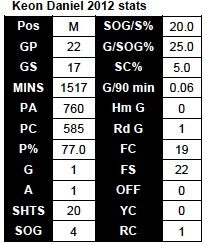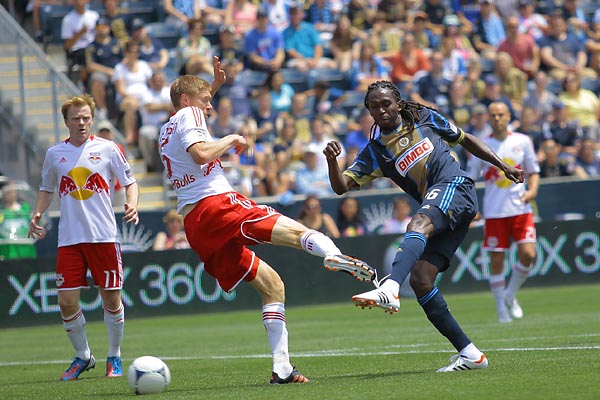Photo: Nicolae Stoian
Editor’s note: At the end of the first two Philadelphia Union seasons, we posted a series of end of the season reviews of every Union player. Over the next several weeks, PSP continues with a review of the 2012 season.
Will the real Keon Daniel please step forth?
Is it the one who impressed in 2011 with his calm, steady ballhandling, impressive aerial ability and versatility in a 4-2-2-2?
Or is it the one who often disappeared on the field this year as he struggled to find a position that fit him in the 4-3-3 deployed this season?
It’s hard to say.
What’s clear is Daniel didn’t have the best season. He got fairly regular minutes (1517), starting half the Union’s 34 games and appearing in 22.
But he was often deployed as an advanced winger in a 4-3-3, something he had not done last year. In the role, he often became invisible. When he did emerge, it was often because he was drifting further from goal to help maintain possession. The end result was a loss of team shape. Because of this tendency from Daniel and other Union “wingers,” the Union’s 4-3-3 typically played more like a 4-2-3-1 or 4-5-1. For most of the 2012 season, it appeared Daniel was simply misplaced on the field and didn’t have a natural role that fit his skills in the Union’s new formation.
While he played most of 2011 on the flanks for the Union, he played less like an attacking winger and more like a possession-oriented central midfielder playing out of position in a 4-2-2-2, albeit one who did it well. He rarely surrendered the ball or made poor passes. Every now and again, he’d step up to unleash a left-footed cannon shot from outside the box, and invariably it was either on frame or just above the crossbar.
That happened too little in 2011.
Still, there were moments where he showed those same skills, such as with his lone goal on June 30 against Houston, when he blasted home a shot from distance. And there were games like the New England game in October, when he repeatedly unlocked the Revolution’s defense with his passing. His crosses and free kicks were pinpoint perfect all night, and it was one of those free kicks that Jack McInerney capitalized upon to net the game’s only goal.
For Daniel, it was always a matter of him finding himself in his comfort zone on the field. Those days, he definitely did.
High Point
The New England game. He dummied one pass to create an open McInerney shot early on and found Mac for another shot shortly thereafter. One near-perfect Daniel set piece could have been headed home by Gabriel Gomez but wasn’t. Gomez blew another attack started by a Daniel pass on the break. His free kick found McInerney for a goal. Moment after moment, Daniel shined. It reminded just how good he can be.
Low Point 
In the Union’s final game of the year, Daniel started the match and had a first half play in which he was in on goal against New York goalkeeper Luis Robles, coming in from the right flank. McInerney and Danny Cruz were heading in on goal. Daniel could have shot or passed it to either. Instead, he pretty much did nothing, continuing to dribble toward goal until he lost the ball. It was probably the closest he’d been to goal all season, and it showed how unused to the situation he was.
Strengths
His possession skills, aerial ability, and power and accuracy from distance. He may not create a ton of chances on the ball, but he rarely gives it up. And he’s one of the few Union players who is a threat in the air.
Separately, Daniel is a player whose skills shine most when he has space from distance. His set pieces are strong. His crossing is good on nights when he’s on. He’s most likely to shoot when given a step outside the 18, and when you see the cannon he has, one can see why. It just takes a bit to unleash it all.
Weaknesses
It’s hard to pinpoint any particular Daniel weakness, other than to say he doesn’t function as well without that space at distance. He’s not a player who looks to make runs behind defenses or even attack them off the dribble, but rather a player used to playing further from goal and seeing the game clearly from afar. That’s more a tendency to accept than a weakness, although it could explain that inexplicably bad play in the Red Bulls game. His biggest weakness may be that these tendencies left him without a clear role that he could fill this season.
Outlook
Why did Keon Daniel really disappear from the Union in September 2011 after leaving the U.S. to join the Trinidad and Tobago national team? Was it visa issues, as advertised? Did he contract dengue fever, experience visa issues as a result, and never recover full health? Would he have ever returned if not for the “Free Keon” movement that emerged in signs, hearts and minds around PPL Park?
Or maybe, just maybe, was he actually kidnapped by aliens in 2011, replaced by a facsimile, and the visa issue was simply a cover-up and delay to allow the operation to take place? Could alien abduction explain Daniel’s play in 2012?
If so, they did a great job on his hair. It looks legit. So does his ballhandling. He’s still just as steady. The left-footed cannon is still there, and so is the accuracy on free kicks. So maybe the alien abduction concept is a tad unlikely.
Still, it makes you wonder which one is the real Keon, the 2011 or 2012 version, and whether the Union’s formation next season will have a place for Daniel. A new “free Keon” movement may be worth starting. This time, he must be freed from playing winger in a misshapen 4-3-3. If not, it could be another lost season spent wandering around a pitch, wasting his skills.
If freed to find his comfort zone, however, Daniel could shine again. Maybe it will be as a deep lying central playmaker. Maybe it will be as a versatile reserve and occasional starter. Or maybe it will be in another city. Union fans should hope against the latter, because Daniel is someone who can definitely play.
Stat chart legend:
POS: Position; GP: Games Played; GS: Games Started; MINS: Minutes; PA: Passes Attempted; PC: Passes Completed; P%: Passing Accuracy Percentage; G: Goals; A: Assists; SOG: Shots on Goal; SOG/S%: Percentage of Shots that are on Goal; G/SOG%: Percentage of Shots on Goal Converted; SC%: Scoring Percentage; G/90min: Goals per 90 minutes; Hm G: Home Goals; Rd G: Road Goals; FC: Fouls Committed; FS: Fouls Suffered; YC: Yellow Cards; RC: Red Cards


In general, this is a good review of decline in Daniel performance between 2011 and 2012. Not sure I agree with his aerial skills. His header ability and time spent in box was lacking. He is taller than most, but does not like physical contact, and like Adu, tends to avoid challenges that would show confidence in his abilities on consistent basis.